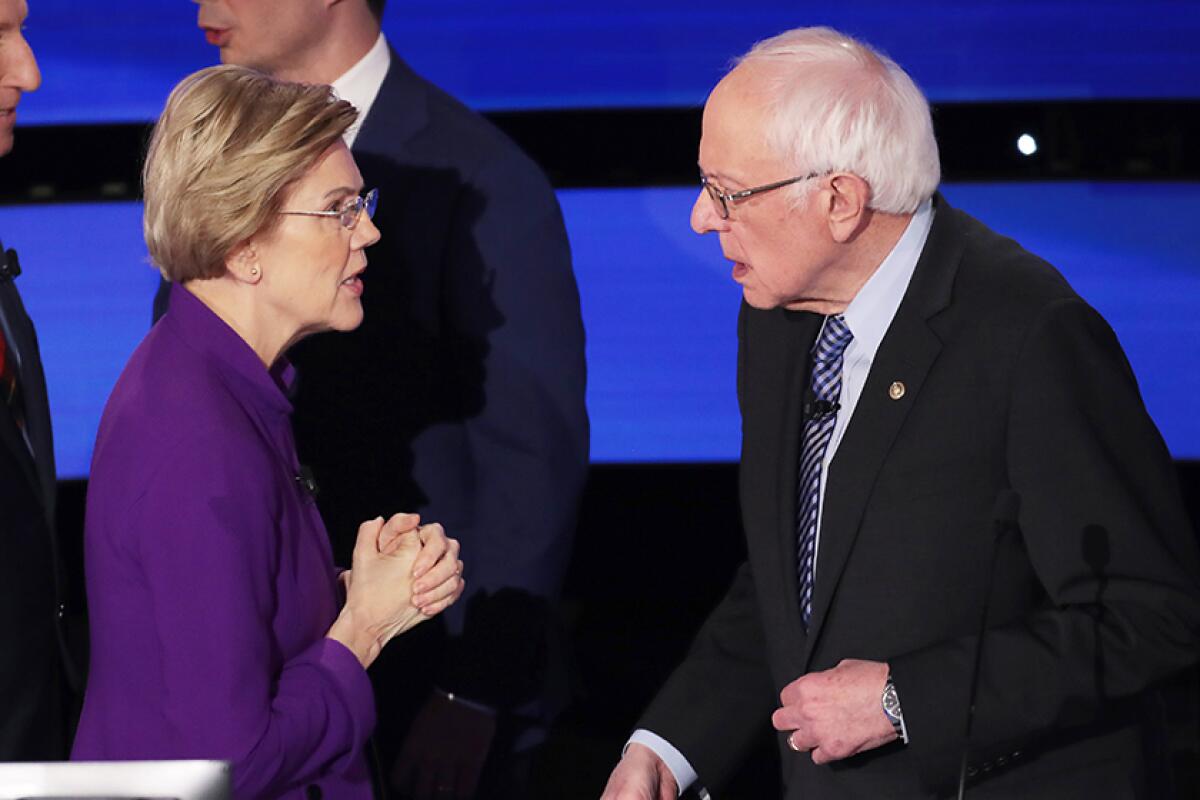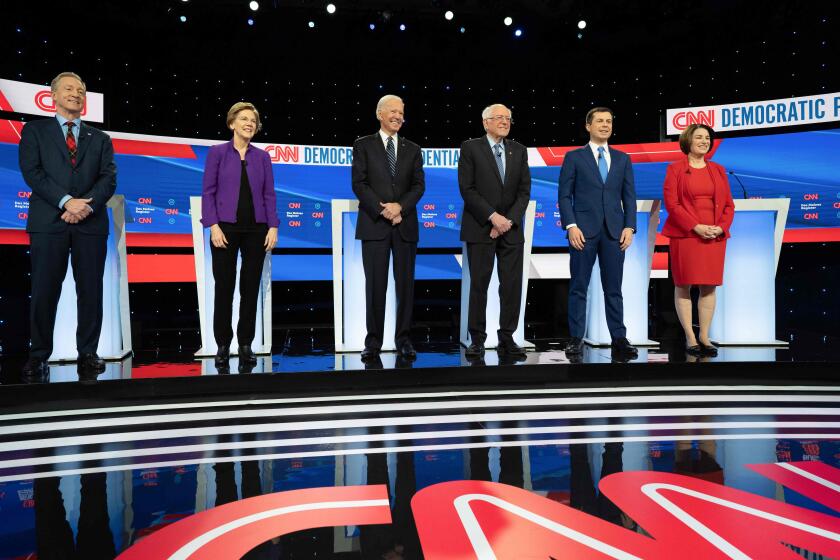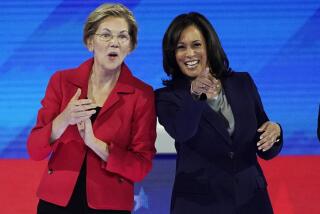Who’s lying? How the Bernie Sanders-Elizabeth Warren feud could reshape the Democratic race

With a pointed snub — a refusal to shake Bernie Sanders’ hand on the debate stage — Elizabeth Warren escalated a feud on the political left that threatens to harm both candidates and undermine their common cause in the final days before the presidential balloting begins in Iowa.
Supporters of the two Democratic hopefuls hurled insults and fresh attacks Wednesday while progressive leaders sought to bring about peace, fearing an outcome — the elevation of a comparative moderate like Joe Biden — that none of the antagonists wish to see.
“Every minute spent talking about the drama between these two people might end up with a Democratic nominee worse for millions of people,” said Adam Green, a Warren supporter who is co-founder of the Progressive Change Campaign Committee. “Both sides know that.”
The two campaigns declined to comment and neither candidate spoke publicly about their dispute, Warren’s cold shoulder or the rising tensions between backers of the two U.S. senators. At issue is whether Sanders questioned Warren’s electability as a woman running for president.
In the aftermath of Tuesday’s debate, where the two largely muted their disagreement, the candidates’ brusque encounter was striking.
Sanders supporters immediately flooded Twitter with images likening Warren to a snake. Warren defenders hurled back charges of misogyny, an accusation that plagued Sanders’ 2016 campaign against Hillary Clinton. Those caught between them despaired.
“We have a primary to win and a White House to take back and progressives cannot do that if we’re punching at each other,” said Rebecca Katz, a Democratic strategist who supported Sanders over Clinton but now backs Warren. (“I still love Bernie,” she hastened to add.)
Elizabeth Warren accused Bernie Sanders of calling her a liar during their post-debate exchange. Sanders responded, “You called me a liar.”
There has been a strong effort on the left to keep the competition between the two from becoming acrimonious, and both candidates were amenable. For months, on the debate stage and off, they repeatedly passed up opportunities to criticize each other, or even seek much separation.
There was a strategic purpose to their entente. Many Sanders supporters have said Warren is their second choice, and vice versa, which gave them incentive to make nice in the event one dropped from the race.
What is more, officials in both campaigns argued the progressive movement is better off having both in the field, the better to amplify their shared agenda and tip the balance away from the party’s more moderate wing. If no candidate has a majority of delegates heading into this summer’s nomination convention, the thinking went, Warren and Sanders may have enough for progressives to choose the party’s nominee.
The New England neighbors — Sanders from Vermont, Warren from Massachusetts — are not just friends but political and ideological soulmates. They scoff at opponents like Biden who advocate less drastic change and together push for policies that would move the country sharply to the left.
After growing animosity that started last weekend, supporters dreaded the prospect of the two clawing each other on a national debate stage. They were relieved when Warren avoided directly confronting Sanders over a statement he allegedly made during a private 2018 meeting that a woman could not win the White House. Sanders insisted he said no such thing.
Immediately after the debate, however, Warren approached Sanders and declined to shake his hand. The two then engaged in a brief but animated discussion that was captured and played repeatedly on cable television and social media. Audio of the exchange surfaced late Wednesday.
“I think you called me a liar on national TV,” Warren said, according to footage aired Wednesday night on CNN, a debate co-sponsor.
“You called me a liar,” Sanders replied. “You told me ... all right, let’s not do it now.”
The danger is that animosities between the candidates, and especially their supporters, could end up hurting both and helping other candidates. The likeliest beneficiary would appear to be Biden, who is leading national polls and effectively running even with Sanders and Warren in Iowa, which casts the first votes of the campaign on Feb. 3.
“Democracy for America has very intimate knowledge of this,” said the group’s communications director, Neil Sroka. The liberal organization is an offshoot of Howard Dean’s unsuccessful 2004 presidential campaign, which foundered when a feud with another candidate in the tightly bunched Iowa pack opened a path for John Kerry to beat them both.
The group had already been working on a statement about the importance of progressive unity in the days before the campaigns started sniping at each other, Sroka said. On Thursday a coalition of 18 progressive groups — some that endorsed Sanders, others Warren — issued a unity statement aimed at ending the acrimony.
“We pledge to focus our fight for the nomination against candidates supported by the corporate wing [of the Democratic Party], instead of fighting each other,” read the three-part pledge that the organizations said members would be asked to sign.
Despite the candidates’ good will, hostilities between their supporters have been building for some time.
Until recently, that friction had largely centered around die-hard Sanders supporters questioning Warren’s credentials as a left-wing progressive, an assertion that may be puzzling to those less inclined to ideological parsing.
Critics have cited Warren’s description of herself as a “capitalist to my bones,” her past registration as a Republican and the relative affluence of her supporters compared to those backing Sanders.
Candidates at the January Democratic debate cover foreign policy, healthcare and climate, and enter charged territory over gender in politics.
The discussion has largely been confined to activists on social media or the pages of left-wing media rather than the town halls and rallies where Sanders and Warren have been grinding for votes.
Now the skepticism of Warren “has gotten much, much worse” because Sanders supporters believe that Warren’s campaign has attacked her erstwhile ally by “accusing him of trashing her and saying a woman can’t be president,” said Nathan J. Robinson, editor of the socialist magazine Current Affairs.
Warren supporters, in turn, complain that Sanders has not done enough to rein in his more combative and belligerent backers, who frequently torment his opponents on Twitter and other social media.
“His silence speaks volumes,” said Claire Celsi, an Iowa state senator who has endorsed Warren. “I know Bernie can’t control all of his followers, that’s impossible. But he can tell everyone to stick to the facts, keep your head up and let’s not slip into the gutter.”
Of course, strong passions are nothing new to political campaigns, even among those who share a party and the same broad philosophy.
Mike Lux, a veteran Democratic strategist, said “overzealous supporters are always a problem,” with the excesses amplified today by the outrage-filled megaphone of social media.
Lux, a Warren supporter, said the harsh words and hurt feelings of supporters are less important than what the principals say and do.
“At the end of the day,” Lux said, “how the candidates and campaigns comport themselves is what’s important.”
As it happens, Sanders and Warren will be spending the next few weeks practically side by side as the impeachment trail of President Trump takes place in the Senate. Their desks in the chamber are just a few seats apart, providing ample opportunity to visit and hash out any grievances.
In an interview Wednesday, Sanders’ wife and political advisor defended her husband’s integrity and sought to tamp down the dispute. “I think that this discussion is over,” Jane O’Meara Sanders told the Associated Press.
That remains to be seen.
Times staff writers Evan Halper in Washington and Matt Pearce in Newton, Iowa, contributed to this report.
More to Read
Get the L.A. Times Politics newsletter
Deeply reported insights into legislation, politics and policy from Sacramento, Washington and beyond. In your inbox three times per week.
You may occasionally receive promotional content from the Los Angeles Times.













